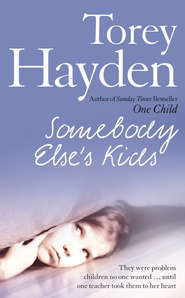По всем вопросам обращайтесь на: info@litportal.ru
(©) 2003-2024.
✖
The Tiger’s Child and Somebody Else’s Kids 2-in-1 Collection
Настройки чтения
Размер шрифта
Высота строк
Поля
Truth was, I loved Jeff. We were the youngest members of staff by quite some years, if not decades, and ours was like a sibling relationship there among the grown-ups. The other psychiatrists all had magnificent offices up front with cornices and fireplaces, carpets and leather couches. In the back of the building Jeff and I shared a windowless closet of an office, which had once housed another psychologist’s research animals and still smelled. Here we had festooned the walls with posters, cartoons and matching Pink Panther nameplates. And here we worked, fought and shared our problems.
What saved Jeff from certain annihilation for his Freudian idiocy was an extraordinary sense of humor. He had a particular gift for funny voices and mimicry, which he displayed with the aplomb of a stand-up comic. As a consequence, the inanimate objects in our office—the filing cabinet, the desks, the radiator—were all inclined to join unexpectedly into conversations, each with its own weird little Robin Williams-type voice. The kids, of course, adored this when they heard it, but it even worked on me. It was difficult to get angry with a guy who had the furniture on his side.
All in all, I was pleased with this career move away from special education. It still felt funny to dress for work in wool skirts and dangly jewelry, to know that I could leave my long hair unbound because no one was likely to try and pull it out of my head; and, indeed, I found I missed my jeans and track shoes too much and was back in them after the first few months. But I fully enjoyed the ample resources and stimulating colleagues and felt that for the moment, at least, this had been the right move.
Chapter 8 (#ulink_a9728400-009f-5e02-af10-918445e7298b)
Sheila was three months short of her fourteenth birthday when I finally located her. I hadn’t seen her in seven years—half her lifetime past—and other than the poem I’d received through the mail two years earlier, I hadn’t heard from her in five. I found her back with her father, living in an outlying suburb of Broadview. After a telephone conversation with her father, I asked if I could visit.
They were living in a duplex, a brown-colored building with peeling paint, in a run-down area where the yards were littered with car bodies and rusting appliances; however, compared to Sheila’s home in the migrant camp, this was luxurious.
I knocked at the door. A long moment passed with no sound beyond the door and I found to my surprise that my knees were shaky. All the ghosts of long ago came crowding in around me as I waited on the doorstep and I could hear them so clearly. A child’s laughter echoed, shouting, squealing, the sounds of a classroom, and then the dark, blowy silence I remembered experiencing as I had stood on the doorstep of Sheila’s tar-paper shack in the migrant camp. Then, back to the present. Footsteps came toward the door and it opened.
I don’t think I would have recognized Sheila’s father if I hadn’t assumed it would be he opening the door. He had changed dramatically in seven years. The dumpy, overweight boozer I recollected was not there. Instead, the man opening the door was slim and athletic-looking and, most startling to me, young. I had been in my early twenties when I had last seen him and I had always regarded him as being in my parents’ generation. Now, with shock, I realized he was, in fact, not much older than I was.
“Mr. Renstad?” I asked tentatively.
He nodded.
“I’m Torey Hayden.”
He smiled in a genuinely welcoming fashion and held the door open. “Come in. Sheila’s not here at the moment. She’s just run over to the store for some milk, but she’ll be back in a few minutes.” He opened the door to let me into the living room. It was small, with a television, a well-worn brown sofa and two old-fashioned armchairs. Indeed, the whole room had a sort of brownish quality to it, but it was comfortable.
Sudden shyness struck us both. All these years I had pondered this moment and now that it was here, I didn’t know quite what to say. He obviously felt just as uncertain.
After a moment, he snatched a photograph from the top of the television. “Here, you want to see this? These are my boys.”
It was the photo of a baseball team, the boys appearing to be about ten or eleven. They were posed in two rows, the first kneeling, the others behind. Mr. Renstad was on the left of the back row.
“I been coaching a year now,” he said, moving beside me to look at the picture. “See that kid? His name is Juma Washington and you listen out for that name, because he’s going to be great someday. Like Hank Aaron, that kid. And it was me that taught him to hit. Wouldn’t do nothing for us when he first came. Was a wild, jazzy kid. And now he’s gonna make the major leagues. You watch and see. I know he’s gonna make it big.”
“That’s super.”
He looked at me. “I’m clean now, you know. Sheila tell you that? No more booze or stuff. I been clean eighteen months now and now it’s me helping them.”
“I’m pleased,” I said.
“I mean it. I’m not having no trouble at all anymore, and now I got these boys. We won four games already this season. Didn’t win no games at all before I took ’em over. Were wild kids, crazy as monkeys. But we’re making it big now. Got Juma. Got a couple of other good ones too. Here, let me show you.” He took the photograph. “Him, that’s Salim. And him, Luis. You ought to see ’em play. Can you come down some Saturday?”
Just then the door banged and there stood Sheila.
Sheila?
Who stood there was a gangly adolescent with—honest to God—orange hair. Not strawberry blond, not red. Orange, like a road cone. It was longish, and permed into frizzy ringlets, a Cubs baseball cap pulled down over the top of it.
Would I have known this was Sheila if I had encountered her on the street? She’d grown taller than I’d expected. She’d been such a tiny, malnourished thing when I’d had her, that I had always kept her small in my mind, but here she was, a good five feet four or so and only thirteen. Adolescence hadn’t worked its full magic with her yet, however. She was gangly and still had the undeveloped figure of a child.
No question about whether or not she recognized me. On seeing me, she stopped abruptly, as if seeing a most unexpected sight. Her cheeks colored. “Hi,” she said and smiled shyly. That smile did it. Her features grew familiar instantaneously.
“Hi.”
All three of us were uncomfortably self-conscious. After anticipating this reunion for so long, I hadn’t expected to find myself at a loss for words, but that’s what happened. Sheila, equally thunderstruck, clung on to her half gallon of milk and stared at me. Only Mr. Renstad seemed able to find his voice. He went back to talking about his baseball team; however, he never asked me to sit down, so we all continued standing there in the middle of the living room.
Sheila’s father just kept chattering. Several times he reassured me that he had given up drugs and alcohol and put his past behind him. This embarrassed me, making me feel as if he were interpreting my visit as checking up on him. He appeared to think Sheila and I had had much more contact with each other over the years than we’d had and so alluded to events that I knew nothing of. I felt it would be indelicate of me to inquire further at this point and thus said nothing, but from what I could make out, Sheila had been in foster care between the ages of eight and ten and then again for a while when she was eleven. They had been living together since his last parole, about eighteen months earlier.
Sheila said absolutely nothing. Like her father and me, she still stood in the middle of the living room, but she made no effort to join in the conversation. I stole glances at her, particularly at her dyed hair, because it was such an unusual color. Then at her clothes. When in my classroom, she had had one single outfit—a brown-striped boy’s T-shirt and a pair of denim overalls—which she had worn day in, day out until her father had finally accepted the dress Chad had bought for Sheila after the March hearing. Sheila didn’t look as if she was faring much better these days. She wore an enormously oversized white T-shirt with a ragged jeans jacket minus the arms layered over the top. Underneath the T-shirt I assumed there was something besides underwear, as I could see what might be the fringed edge of cut-off jeans, but I wasn’t sure. Contemplating the outfit, I assumed this was fashion and not poverty showing.
Finally, when her father paused, I turned to her. “I passed a Dairy Queen coming over. Would you like to go get a sundae with me?”
Alone in the car with me, Sheila remained silent. It was by no means a hostile silence, but it was uncomfortable enough. I found myself wandering back to the very first day I had met Sheila. She had been silent then too, fiercely silent, breaking it only to announce with tigerish vehemence that I couldn’t make her talk. I kept calling back to mind that charismatic little girl I had known and trying to find her in this nervous adolescent. I was only too aware that I didn’t know this strangely clad, deerlike thing at all.
Pulling into the parking lot of the Dairy Queen, I looked over. “Remember when I used to take everybody over to the Dairy Queen and buy those boxes of Dilly bars? And how Peter always wanted something different? Never mattered what it was, he never wanted what everyone else was having.”
“Who’s Peter?”
“You remember. In our class. He used to always tell those awful jokes. The real groaners. Remember him?”
A pause. “Yeah … I think. He was Mexican, wasn’t he?”
“Well, actually, he was black.”
We chose our sundaes and then went out to sit at a picnic table in front. Sheila hunched over her ice cream in a manner that evoked memories of her early days in the class, when she would clutch her lunch tray up close to her, wary, like an animal, in case someone tried to take it away from her before she finished. She began to stir her sundae. The ice cream, chocolate sauce and whipping cream all went together in a gooey mess.
“So how’s school?” I asked.
“All right, I guess.”
“What courses are you taking?”
“Just the usual stuff.”
“Anything good?” I asked.
“No, not really.”
“Anything hard?”
“Not really,” she said and stirred more energetically. “Boring, most of it.”
Looking for some angle to get a conversation started, I resorted to an old trick I’d used in the classroom to stimulate a child to talk. “So what do you hate most about it?”
“Being youngest,” she said without hesitation. “I hate that.”
An accusation? She knew I had been responsible for moving her forward a grade. Was there a second meaning here? “What do you hate so much about it?”
She shrugged. “Just being youngest, that’s all. Littlest. I was always so much shorter than everyone else, right up until just this last year. And always the baby of the class. Everyone picked on me.”
“Yes, I can see where that might cause problems,” I said, “but it was hard for us to know what was best for you.”











